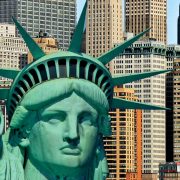China recently enacted the Hong Kong National Security Law, which many international organizations and governments have criticized as antidemocratic. In response, U.S. Congress passed the Hong Kong Autonomy Act, a sanctions package that punishes banks that engage in business with Chinese officials. While this act is a powerful countermeasure to the Chinese government, the U.S. still has several actions it could take, including using the EB-5 Immigrant Investor Program to attract investors from Hong Kong to the U.S.
What Does the EB5 Investment Program Do for the U.S.?
Created by Congress in the 1990s, the EB-5 investment program delivers billions in foreign capital to U.S. markets and companies. This capital is provided by foreign investors who can acquire permanent residency in the U.S. for themselves and their qualifying family members if they are eligible for the program. An important requirement for the program is that investors must invest a minimum of $1.8 million in a project, with that figure dropping to $900,000 if a project is located within a targeted employment area (TEA).
A 2019 Study by Economic and Policy Resources found that the EB-5 investment program provided more than $55 billion of foreign capital and created more than 355,000 jobs in two years. Perhaps even more importantly, the program operates at “no significant cost to the federal government,” according to the nonpartisan Congressional Budget Office.
How Could the EB5 Investment Program Be Improved to Make it More Competitive to Hong Kong Investors?
The Chinese political environment has resulted in an ideal opportunity for the U.S. government to enact reforms to the EB-5 investment program. Reforms that make the EB-5 investment program more attractive to EB-5 investors from Hong Kong will help those in Hong Kong to escape the Chinese government’s oppression while also creating many jobs in the U.S. when the country is suffering the effects of the COVID-19 pandemic.
If enacted, these reforms would send a message to Beijing, attract Hong Kong’s most successful entrepreneurs, and create thousands of new U.S. jobs.
What Could a Hong Kong Focus Look Like?
The United States is not the only country with an immigration investment program and will need to enact reforms to remain competitive in the Hong Kong market. Other nations with investment programs and interests in Hong Kong include the United Kingdom and Canada.
The U.K. Has Granted Renewable Visas to Eligible Hong Kongers
As citizens of a former British colony, an estimated 350,000 Hong Kongers currently hold British passports with an additional two million also eligible. U.K. Prime Minister Boris Johnson announced that Hong Kongers can apply for renewable visas that would allow them to be employed in the U.K. and set them on the path for possible citizenship.
Canada Has Been Ahead of the Game for a While When It Comes to Hong Kong Investors
In preparation for the expiration of the British lease on Hong Kong in 1997, Canada marketed its immigrant investment program to successful Hong Kongers. Since then, Canada has received billions in foreign capital that revolutionized many cities around the country, such as Vancouver, and had many successful and talented Hong Kongers permanently immigrate to the country where they continue to grow Canada’s economy.
What Is the Current Status of EB5 Legislative Reforms?
Unfortunately, the EB-5 investment program is not the most attractive offer for Hong Kong investors and the situation has gotten worse, not better. Former President Trump signed the Hong Kong Normalization Order, a policy that suspends or eliminates any preferential treatment for Hong Kongers versus those in mainland China. It is consequently more difficult than ever for Hong Kongers to participate in the EB-5 investment program.
This order means that Hong Konger applicants are also subjected to the same visa backlogs historically faced by Chinese investors. While Hong Kong is a major source of EB-5 investors, the EB-5 investment program in its current forms only scratches the surface of Hong Kong’s financial potential.
What Reforms Would Make the EB5 Investment Program More Competitive?
The EB-5 investment program needs common-sense reforms to remain competitive against other nations in the Hong Kong market. Otherwise, the U.S. will only continue to lose out to other countries such as Australia, Canada, Singapore, and the United Kingdom.
Possible reforms for the EB5 investment program include the following:
- Creating an alternative application pathway for Hong Kong investors that exempts them from traditional visa caps during this difficult time. This would increase the EB-5 investment program’s competitiveness over other countries’ offerings.
- Adding a requirement that Hong Kong investors only invest in TEAs. If implemented, this proposal would promote economic development in the areas with the greatest need.
Thankfully, several U.S. congresspeople have expressed interest in a recovery bill that addresses the EB-5 investment program in relation to Hong Kong. These reforms would send a powerful message to China, uphold democratic principles, and provide a valuable stimulus to the U.S. economy.







